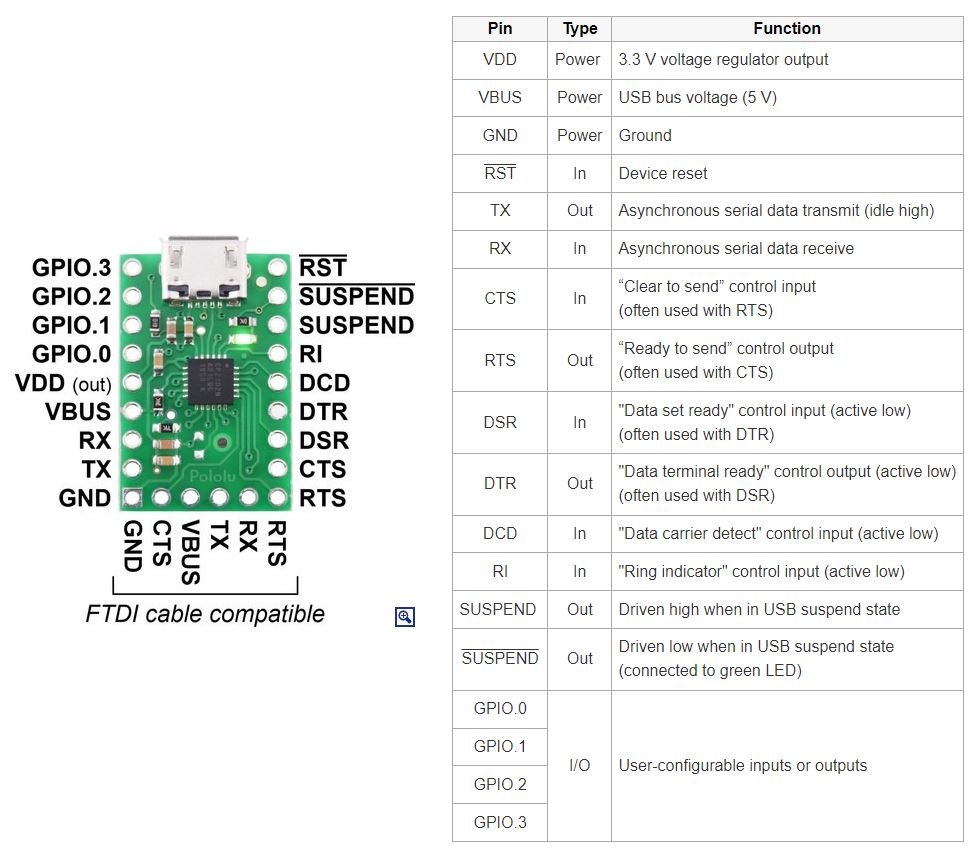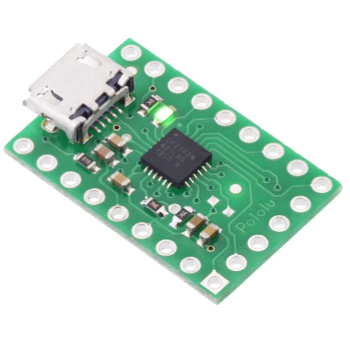This USB-to-serial adapter lets you easily connect a TTL serial device to a PC by acting as a virtual serial port. The board is a Micro-USB carrier for the Silicon Labs CP2102N USB-to-UART bridge that provides access to all of its control signal pins and GPIO pins.
Overview
This USB-to-serial adapter is a breakout board for the Silicon Labs CP2102N USBXpress USB-to-UART bridge, and it is a great solution for connecting microcontroller projects and other logic-level serial devices to a personal computer. The tiny unit measures only 0.6″ × 0.95″ including its Micro-USB connector. It offers several options for accessing the data, control, and GPIO pins on the CP2102N, all of which are made available on a 0.1″ spacing.
This board uses 3.3 V signal levels by default, but the signal pins can tolerate higher voltages, allowing the adapter to be used with 5 V systems that see 3.3 V as a logic high. The green LED on the SUSPEND line indicates an active USB connection when lit.
The adapter looks like a standard virtual serial port (COM port) to the computer’s operating system, which means it can be used with any software designed to work with a serial port (even a legacy RS-232 port). The CP2102N is a full-speed USB 2.0 device and allows baud rates of up to 3 Mbps. Drivers are available from Silicon Labs for Windows XP, Windows Vista, Windows 7, Windows 8, Windows 10, Linux, and Mac OS X.
This product requires a USB A to Micro-B cable (not included) to connect to a computer.
For most applications, this CP2102N carrier can be considered a drop-in replacement for the older CP2104 USB-to-Serial Adapter Carrier with a few improvements like a higher maximum baud rate and re-programmable configuration ROM.
Specifications
- Dimensions: 0.6″ × 0.95″ including connector
- USB standard: USB 2.0 (full speed)
- Connector: USB Micro-B
- Logic voltage level: 3.3 V (5 V tolerant)
- Supported baud rates: 300 bps to 3 Mbps
- Supply current: 15 mA
Using the adapter
Pinout

Connections
All of the adapter’s pins are available in two rows spaced 0.5″ apart along the sides of the board. This allows any pin to be accessed easily while the adapter is plugged into a solderless breadboard, as shown in the left picture below.
Alternatively, a 1×6 header can be soldered to the end of the board, as shown in the right picture below. This gives access to six signals (RTS, RX, TX, VBUS, CTS, and GND) that are commonly found on FTDI cables and other similar USB-to-serial adapters. As a result, this CP2102N adapter board can be used as a drop-in replacement for an FTDI cable in many applications, such as programming Arduino-compatible boards.
Using a different VIO
This carrier board connects the VIO pin of the CP2102N to VDD by default, setting its logic voltage level to the 3.3 V provided by the IC’s built-in voltage regulator. If you want to use a lower logic voltage, you can disconnect VIO from VDD by cutting the thin trace between the two pads of the surface-mount jumper shown to the right. You can then solder a thin wire to the exposed via labeled “VIO” and connect it to a separate voltage supply (as low as 1.71 V).
Warning: We do not recommend externally supplying VIO to this board while it is not connected to USB, as this can cause it to draw excessive current (up to a few hundred milliamps).
Advanced features
You do not need to be familiar with details of the CP2102N to use this board as a basic USB-to-serial adapter, but the CP2102N also has specialized features including four general-purpose I/O (GPIO) pins and the ability to be customized by configuring its internal EEPROM. For advanced users interested in these features, we recommend careful reading of the CP2102N datasheet (619k pdf). Additional resources, including application notes referenced by the datasheet, can also be found on the CP2102N product page on the Silicon Labs website.

